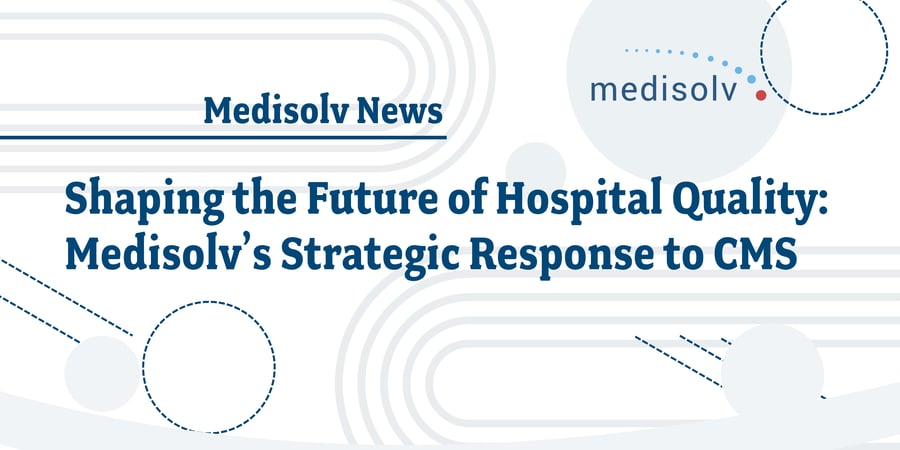Shaping the Future of Hospital Quality: Medisolv’s Strategic Response to CMS

CMS released their 2026 IPPS Proposed Rule with several significant changes to hospital quality measurement and reporting requirements. We submitted detailed comments supporting some proposals while opposing others that would eliminate important measurement tools.
Here’s what we told CMS and why.
What We Supported
In our CMS response, we supported several proposals that modernize the evaluation and reimbursement of hospitals, making quality measurement more clinically relevant, patient-centered, and achievable. These aren’t just policy tweaks; they’re meaningful changes that help hospitals deliver better care with less reporting burden.
Hybrid Measure Threshold Reductions
CMS proposed lowering thresholds for reporting hybrid readmission and mortality measures, clinical data elements that, combined with claims data, provide a more robust risk adjustment of patient outcome measures compared to claims-only methods.
We backed this change, drawing on years of hybrid risk-adjusted measure leadership and real-world client experience. Hospitals have already done the hard work. Now it’s time to set goals that are achievable, meaningful, and aligned with that investment.
Hospital Harm eCQMs: A Better Alternative to PSI-90
While not addressed in this proposed rule, we believe CMS should accelerate the transition away from outdated PSI-90 claims-based metrics by expanding the use of Hospital Harm eCQMs. These EHR-based measures offer a more accurate, real-time view of patient safety events like hypoglycemia, opioid-related harms, and falls. In our experience, they deliver faster insights and can reduce reporting costs by up to 90%. It’s a smarter, more sustainable path forward, and one that supports hospitals in improving outcomes while lightening administrative burden.
The TEAM Model + PRO-PMs
CMS maintained the TEAM model (a 30-day episode payment structure) and proposed adding the Information Transfer PRO-PM as an additional quality measure. This patient-reported outcome measure evaluates how well care is coordinated during transitions between settings.
We supported this addition because it captures the patient's perspective on communication and coordination, often the weakest link in episode management. The measure drives improvements that extend beyond TEAM episodes and provides hospitals with actionable data to improve care coordination across the entire continuum.
Where We Drew the Line
Not every proposed change moves the industry in the right direction. Medisolv opposed two CMS proposals that would roll back progress on equity and transparency, both of which are essential to delivering better care and protecting vulnerable populations.
Eliminating SDOH Measures
CMS proposed removing SDOH-01 and SDOH-02 from the IQR program, measures that track key health-related social needs, including housing, food insecurity, and transportation. We pushed back. Eliminating these measures contradicts recent congressional guidance focused on rural health and ignores the clear cost impact of social risk ($12,967 vs. $5,152 per patient). Hospitals can’t improve what they can’t see.
Removing the Health Equity Adjustment (HEA)
The HEA bonus provides essential support for hospitals serving dual-eligible and high-risk patients, recognizing the additional resources needed to deliver equitable care. Removing it sends the wrong message and creates the wrong incentives, discouraging hospitals from serving those who need care the most.
What We Told CMS About FHIR
FHIR-based eCQMs represent a smarter, more efficient future for hospital quality reporting, but only if hospitals have the proper support and infrastructure in place. In our response, we urged CMS to approach this transition with realistic expectations and collaborative solutions.
- Most EHRs aren’t designed to handle the full complexity of quality reporting, from data capture to submission.
- Hospitals need help bridging data gaps across systems, and third-party vendors like Medisolv are already doing that work.
- Third-party vendors with deep expertise in quality management must have a seat at the table when it comes to developing, testing, and implementing new measures.
- CMS should fund pilot programs and provide targeted support for rural and under-resourced hospitals to ensure no one is left behind in this digital transition.
Why It All Matters
These proposals aren’t just regulatory updates, they’ll shape how hospitals are rated and regulated for years to come.
Our responses aim to:
- Protect the hospitals we serve, especially those most impacted by the proposed changes.
- Ensure hospitals have the right partners, including third-party technology vendors like Medisolv, to navigate increasingly complex, digital-first quality programs.
We’re not just helping hospitals comply. We’re helping them lead.
As the rules evolve, know this: Medisolv is already working on what’s next, and we’re here to help you do the same.
Request a Free Strategic Planning Session
Let’s navigate what’s next — together.
Medisolv is a national leader in healthcare quality data management solutions for hospitals, providers, ACOs, and more. Its all-in-one quality management platform, ENCOR, helps healthcare organizations advance patient care by measuring and improving their performance on more than 500 national quality and safety measures, including those required by the Centers for Medicare and Medicaid, The Joint Commission, private payers, and state agencies. Medisolv now serves more than 1,800 hospitals and ACOs nationwide. They have been honored with the Best in KLAS award and the Black Book award for healthcare client satisfaction, as well as the HIMSS Policy Changemaker award for their pioneering work in digital quality measurement. For more information about Medisolv, please visit www.medisolv.com.



.png?width=352&name=2026%20Quality%20Reporting%20Deadlines%20Guide%20(1).png)

Comments